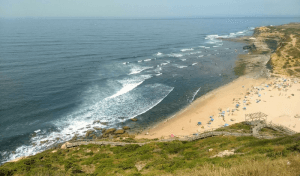Making the most out of your PhD by combining it with travelling
By Emma J Butcher, on 14 January 2019
Written by Leevi Kerkelä, PhD student in Developmental Imaging and Biophysics Section at UCL’s Great Ormond Street Institute of Child Health, and an outdoors enthusiast
Check out the Champalimaud’s Neuroscience Programme twitter: @Neuro_CF
When I moved to the UK to start my PhD project, I was eager to begin my studies in a university that prides itself on being London’s most international university. Having done my MSc in a department where PhD students were expected to visit an overseas lab to conduct part of their research, I was interested in gaining some experience abroad. At UCL, networking with international peers during conferences is common, but visiting labs overseas for actual research is rare. Students are free to go assuming they can do relevant work and get their supervisor’s approval. I spent four months of the second year of my PhD abroad and would like to share my experience to encourage others to do so.
I came up with the idea of visiting a lab abroad on a cold and rainy afternoon in Cornwall. I had spent a week surfing just to have to leave the ocean the very day I started to feel comfortable in it. The previously elusive bottom turn had started to feel natural, and I was not happy having to travel back to landlocked London. Dreaming about being able to surf on a daily basis, I searched for relevant research groups in Portugal. I was delighted to find a group in Lisbon working on MRI methods that perfectly matched the scope of my PhD project. After receiving an approval from my supervisor, I approached the principal investigator in Lisbon via e-mail. After a few e-mails and a Skype call, we agreed that I would visit the Champalimaud Centre for the Unknown for four months to work on double diffusion encoding methods for quantifying brain tissue microstructure with MRI.

Portugal has been blessed with over a thousand miles of truly magnificent coastline. This surfing gem of Ribeira d’Ilhas in Ericeira is less than an hour away from central Lisbon
During the first week of my placement, I was absolutely blown away by the beauty of my new temporary home and the quality of the research at Champalimaud. The powerful equipment allowed me to perform interesting experiments that would not have been possible at GOSH. This freedom with experimenting led me to develop a deeper understanding of MRI which has greatly helped me to make progress with my PhD project. Combining the stimulating work environment with living at the beach and enjoying the fantastic weather made these four months an unforgettable experience.

A motivated student on my first day. The Champalimaud building is an architectural masterpiece that attracts visitors for its design. Most working spaces overlook this garden in which researchers can have a relaxing break under the palm trees.
For anyone interested in visiting a research group overseas, I would give the following advice.
1) Find a research group that is relevant to your PhD project. Three or four years is a short time for finishing a PhD project, so it is crucial that your time abroad is not wasted.
2) Decide whether to briefly visit in order to learn something new or to visit for a longer period of time to conduct a short research project.
3) Speak to your supervisor and the foreign PI only after you have a good idea of what you would like to achieve with the visit.
Post-graduate studies can be a period of time filled with exceptional individual responsibility and freedom, so I strongly recommend making the most out of this time of your life.
Postscript from Faculty Graduate Tutor (Research): note that any student can also apply to take a funded research period in the USA and Canada through the UCL Bogue Fellowship Scheme.
 Close
Close







